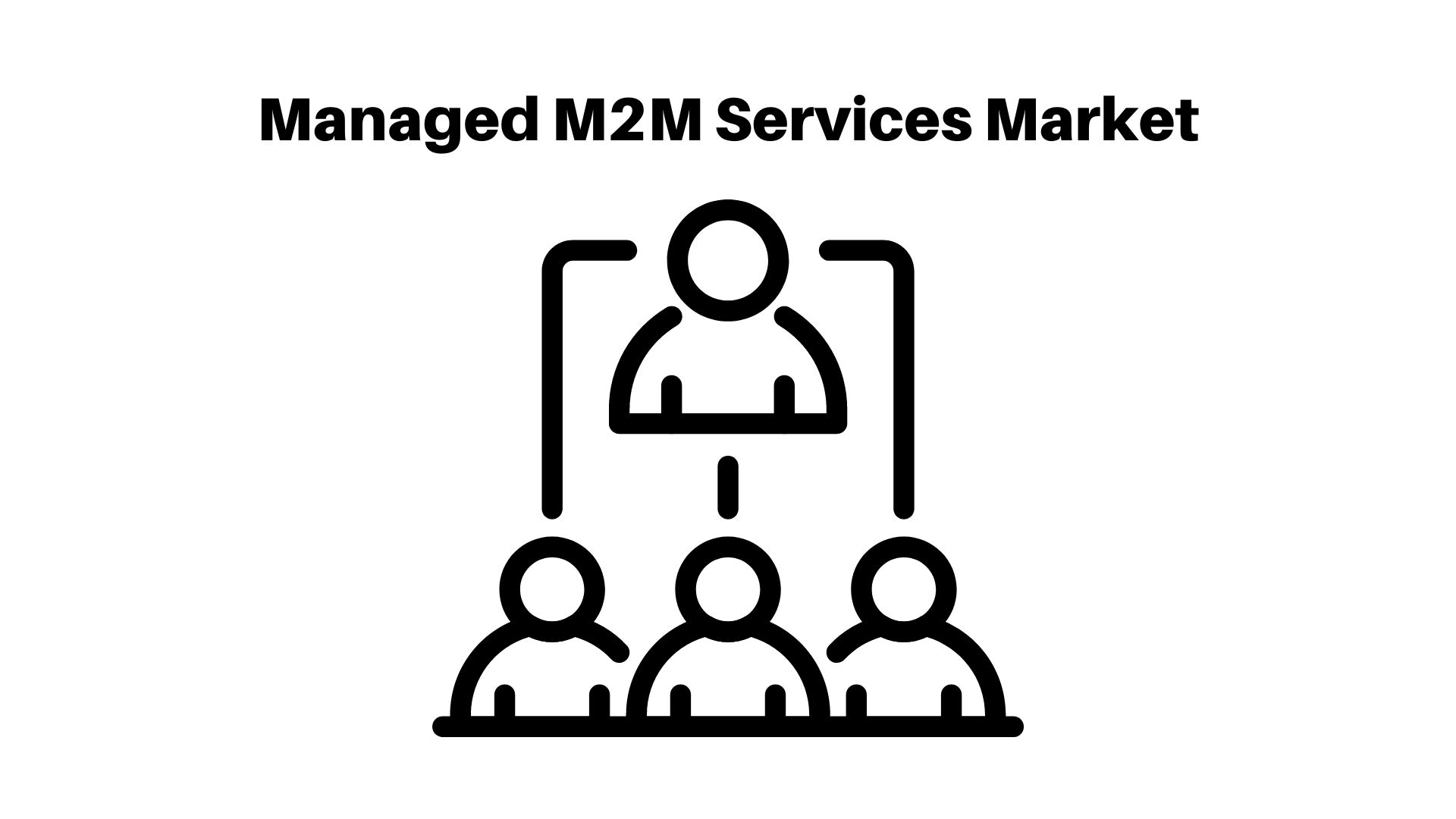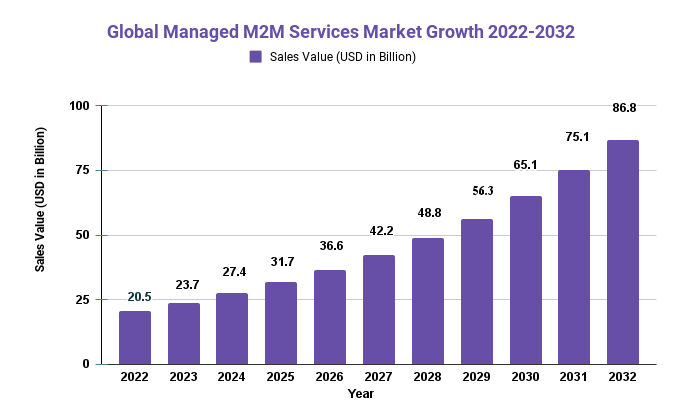Managed M2M Services Market Size Worth USD 86.8 Bn by 2032

Page Contents
Market Overview
The global Managed M2M Services Market was experiencing rapid growth and is anticipated to do so for the foreseeable future. These managed M2M solutions involve controlling machine-to-machine (M2M) communication networks, which enable devices to exchange data with each other and with a central system.
Some of the primary drivers behind this growth include an increasing adoption of IoT devices across various industries, the need for real-time data monitoring and analysis, as well as an increasing need for end-to-end managed services that can simplify M2M deployments.
In 2022, the Managed M2M Services Market was valued at USD 20.5 Bn and is forecast to reach USD 86.8 Bn by 2033 with a compound annual growth rate (CAGR) of 15.5% during that timeframe. North America was identified as the leading market for managed M2M services followed by Europe and Asia Pacific, according to this report.
The report noted that manufacturing was the leading sector adopter of managed M2M services, due to its need for process optimization and supply chain management. Other key industries driving growth in managed M2M offerings included healthcare, retail, automotive, energy & utilities.

Drivers, trends, and challenges have an impact on market dynamics, which can impact businesses. Request for PDF sample report
Key Takeaways
- The market is growing rapidly and is expected to keep rising in the coming years, due to the increasing adoption of IoT devices across industries as well as an increasing need for real-time data monitoring and analysis.
- North America is the leading market for managed M2M services, followed by Europe and Asia Pacific.
- The manufacturing sector is the leading user of managed M2M services, due to its need for process optimization and supply chain management. Other key industries driving growth in managed M2M offerings include healthcare, retail, automotive, energy & utilities.
- Leading players in the managed M2M services market include AT&T, Verizon, Vodafone, Cisco Systems, and Deutsche Telekom, among others.
Regional Overview
North America: North America dominates the managed M2M services market, with the United States as its dominant player. This region is marked by the high adoption of IoT devices across industries, advanced IT infrastructure, and an accommodating regulatory environment.
Europe: Europe is the second-largest market for managed M2M services, with countries such as Germany, France, and the UK dominating. This region is marked by an intense focus on industrial automation, increased government initiatives toward smart cities, and numerous technology vendors.
Asia Pacific: This rapidly developing market for managed M2M services is led by China, Japan, and South Korea. The region is marked by increasing adoption of IoT devices across various industries, an expanding population, and government initiatives towards smart city development.
Rest of World: This market for managed M2M services is relatively small, with countries like Brazil, South Africa, and the UAE dominating. This region is marked by increasing investment in IoT infrastructure, increased demand for real-time data analytics, and government initiatives toward smart city development.
Drivers
Adoption of IoT Devices: As IoT deployments spread across industries, companies are seeking managed M2M services in order to effectively manage and optimize their IoT operations.
Real-Time Data Monitoring and Analysis: Managed M2M services provide real-time data monitoring and analysis, which is critical for industries such as manufacturing, healthcare, and retail where timely insights can enhance operational efficiency and customer experiences.
Need for End-to-End Managed Services: As M2M deployments become more intricate, there is an increasing demand for comprehensive managed services that can simplify the process of setting up, monitoring, and maintaining IoT devices.
Government Initiatives: Governments around the world are investing in IoT infrastructure and smart city development, which is driving demand for managed M2M services.
Restraints
Security and privacy worries: With the growing use of IoT devices, concerns over data security and privacy have arisen, which could limit growth in the managed M2M services market.
Lack of Standardization: Lack of standardization in IoT technologies and protocols could impede the adoption of managed M2M services, as it makes it challenging for organizations to integrate different IoT devices and platforms.
High Implementation Costs: Implementing managed M2M services can come at a hefty price tag, making it difficult for smaller organizations to afford these features.
The complexity of M2M Deployments: M2M deployments can be intricate, necessitating expertise in areas such as connectivity management, device management, and application enablement. This could limit the adoption of managed M2M services.
Opportunities
Industry 4.0: The advent of Industry 4.0, marked by the integration of physical and digital systems, presents a major opportunity for managed M2M services providers as organizations seek to optimize their operations through IoT devices.
Smart Cities: Governments around the world are investing in smart city development, creating an immense opportunity for managed M2M services providers as it permits the deployment of IoT devices to monitor urban infrastructure.
Data Analytics: The growing demand for real-time data analytics presents a lucrative opportunity for the managed M2M services market, as it allows organizations to use insights gained from IoT data to enhance their operations and decision-making processes.
Edge Computing: The advent of edge computing, which places data processing at the edge of a network, presents an opportunity for managed M2M services providers as it improves IoT deployment performance and efficiency.
Challenges
Data Security and Privacy: Data security and privacy remain a top concern for the managed M2M services market, as the growing use of IoT devices raises concerns about data breaches and cyber threats.
Lack of Standardization: The lack of uniformity in IoT technologies and protocols poses a challenge for the managed M2M services market, as it makes it difficult for organizations to integrate different devices and platforms.
Integration Challenges: Integrating managed M2M services with existing IT infrastructure can present a formidable obstacle, as it necessitates expertise in areas such as connectivity management, device management, and application enablement.
High Implementation Costs: The high initial expenses associated with implementing managed M2M services can be a deterrent for adoption, particularly among smaller organizations with limited resources.
Recent Developments
- In March 2021, Ericsson announced the launch of its IoT Accelerator Marketplace, which enables service providers to offer their IoT services to customers around the world.
- In February 2021, Cisco announced the launch of its IoT Security Architecture, which provides end-to-end security for IoT deployments.
- In January 2021, Verizon announced the launch of its Managed IoT Connectivity service, which enables organizations to manage their IoT devices and data through a single platform.
- In December 2020, AT&T announced the launch of its IoT Guardian service, which provides real-time security monitoring for IoT devices.
Key Market Segments
Type
- cloud-based
- on-premises
Application
- smart homes
- medical & healthcare
- manufacturing
- automotive & transportation
- retail (supply chain)
- agriculture and military & defense
Key Market Players
- Aeris
- AT&T
- Arkessa
- Deutsche Telekom AG
- Digicel
- KORE Wireless Group
- Eseye Limited
- Orange Business Services
- ORBCOMM
- Telefónica S.A.
- Verizon Enterprise
- Vodafone Limited.
Report Scope
| Report Attribute | Details |
| The market size value in 2022 | USD 20.5 Bn |
| Revenue Forecast by 2032 | USD 86.8 Bn |
| Growth Rate | CAGR Of 15.5% |
| Regions Covered | North America, Europe, Asia Pacific, Latin America, and Middle East & Africa, and Rest of the World |
| Historical Years | 2017-2022 |
| Base Year | 2022 |
| Estimated Year | 2023 |
| Short-Term Projection Year | 2028 |
| Long-Term Projected Year | 2032 |
Frequently Asked Questions
Q: What are managed M2M services?
A: Managed M2M services are services that enable organizations to manage their machine-to-machine (M2M) communications, including the deployment, monitoring, and management of IoT devices.
Q: What are the benefits of managed M2M services?
A: The benefits of managed M2M services include improved operational efficiency, real-time data monitoring and analysis, simplified deployment and management of IoT devices, and enhanced security and privacy.
Q: What are some of the challenges associated with managed M2M services?
A: Some of the challenges associated with managed M2M services include data security and privacy concerns, lack of standardization in IoT technologies and protocols, integration challenges, and high implementation costs.
Q: What are some of the recent developments in the managed M2M services market?
A: Recent developments in the managed M2M services market include the launch of IoT Accelerator Marketplace by Ericsson, the launch of IoT Security Architecture by Cisco, the launch of Managed IoT Connectivity service by Verizon, and the launch of IoT Guardian service by AT&T.
Q: What are some of the key opportunities in the managed M2M services market?
A: Some of the key opportunities in the managed M2M services market include Industry 4.0, smart city development, data analytics, and edge computing.
The team behind market.us, marketresearch.biz, market.biz and more. Our purpose is to keep our customers ahead of the game with regard to the markets. They may fluctuate up or down, but we will help you to stay ahead of the curve in these market fluctuations. Our consistent growth and ability to deliver in-depth analyses and market insight has engaged genuine market players. They have faith in us to offer the data and information they require to make balanced and decisive marketing decisions.



